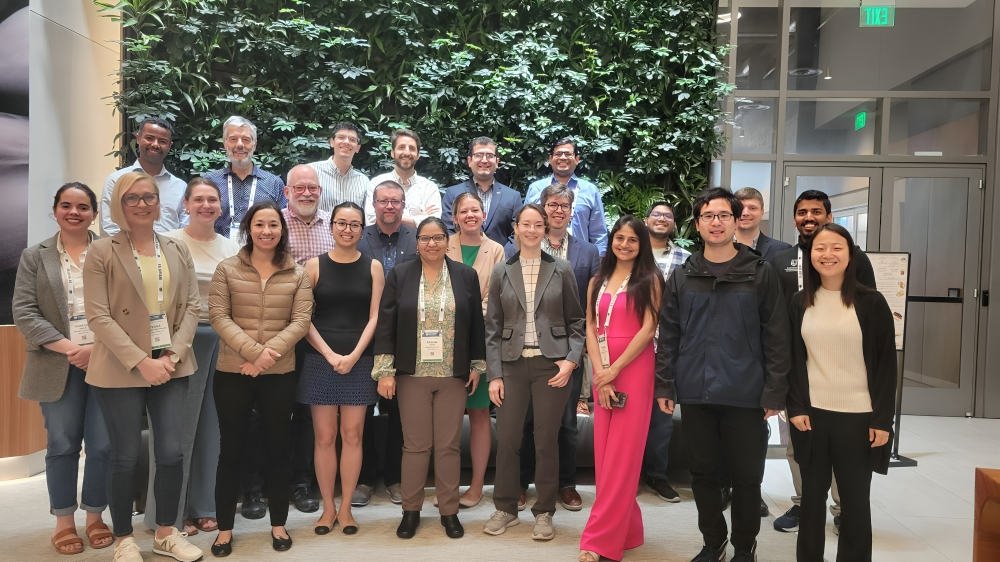For the third year, the Interior Northeast I-Corps Hub (IN I-Corps) led a hybrid I-Corps regional course that included a funded customer discovery trip to the BIO International Convention, the world’s largest biotech industry event.
Through their research, participants in the course are developing high-tech solutions to the most pressing issues in biotechnology, from vaccine efficacy to cancer treatment. By providing immersive entrepreneurship training, the National Science Foundation (NSF) I-Corps program prepares researchers to make a positive economic and societal impact with their innovative technologies.
The course began in May with two weeks of virtual entrepreneurship training. Then, teams traveled to San Diego for BIO, where they interviewed at least 30 potential customers to assess the market potential of their innovations. With more than 18,500 people in attendance from the industry, academia, nonprofit, and government sectors, the convention provided the ideal setting for thorough customer discovery.
“The customer discovery interviews we completed at BIO were instrumental to helping us narrow in on our technology’s market size and specifically what aspects of our product are desirable offerings for potential customers,” said Katherine Lee, a Ph.D. student in the Vaccine Development Center at West Virginia University’s School of Medicine.
“Prior to this course we felt pretty confident about what our business model was, but by the end of the convention we had reworked it into something more complex that really leveraged our scientific expertise in addition to our more tangible products,” she said.
During the trip, teams also received in-person coaching from experienced instructors Greg Ray (Cornell University Johnson Graduate School of Management) and John Inserra (University of Pittsburgh Innovation Institute) and regularly met as a group to report on their progress.
Ten teams completed this year’s BIO I-Corps regional course:
- LumiVoltz (Yanxin Ji and Bartosz Wojciech – Cornell University) is developing microelectronic devices to make electrochemical reactors more efficient and easier to adopt for the pharmaceutical industry.
- Target-Sci (Alexander Epstein – Rockefeller University) is developing a technology that makes single-cell RNA sequencing more affordable, detailed, and efficient, enabling the discovery and validation of new drug targets.
- YouBiotics (Matthew Borrelli and Alireza Mohammadzadeh – University of Pittsburgh) is training probiotics derived from a person’s own microbiome to consume fats and serve as a weight-loss solution.
- AgInnova Bioscience (Melkamu Woldemariam, Murli Manohar, and Edison Hidalgo – Boyce Thompson Institute) is developing effective, cost-effective biopesticides as an alternative to the synthetic chemicals traditionally used in agriculture.
- iSense (Pritom Chowdhury and Varsha Shukla – Dartmouth College) is creating a wearable, non-invasive device to monitor cardiovascular health, offering insights into heart function, blood flow, and overall vascular health.
- VDCmRNA (Katherine Lee and Heath Damron – West Virginia University) is developing mRNA genetic adjuvants that enhance the immune responses of vaccines, with applications in cancer treatment, vaccine development, and pandemic preparedness.
- ProBioMe (Rebecca Valls, Kaitlyn Barrack, and Sarvesh Surve – Dartmouth College) is developing a probiotic to alleviate intestinal and systemic symptoms for patients with cystic fibrosis.
- SanarHealth (Vesna Tumbas Saponjac and Rashim Singh – Houston College of Pharmacy) is developing a chewing gum that reduce the adverse dental effects of saliva-secreted drugs by removing them from the oral cavity.
- CellSmart Injections (Alicia Matavosian – Cornell University) is developing a smart syringe that can inject a specified number of living cells into a patient by actively monitoring a sample as it is injected.
- microDX (Chi Nguyen and Amina Lazrak – Memorial Sloan Kettering Cancer Center) is combining high-resolution microbiome sequencing and machine learning to optimize patient selection and guide the deployment of cancer treatments.
The group reconvened online after the convention to present their findings and discuss the next steps on their journey from innovation to impact.
“Talking through our business model with the course instructors and further considering it through the lens of the course materials helped me to realize a much more precise value proposition that we can focus on as we continue to develop our biotech startup,” Lee said.
Now that teams have completed this I-Corps regional course, they are equipped to take the next steps in developing their startups.
“My team gained valuable insights into market strategies, particularly regarding identifying our actual customer and understanding their pain points,” said Rebecca Valls, a Ph.D. candidate at Dartmouth College’s Molecular and Cellular Biology Department. “For example, although we initially considered pursuing insurance routes to get our product to customers, the challenges faced by patients and physicians with this approach led us to pivot towards a supplement-based strategy.”
Next steps for some teams include taking a deeper dive into customer discovery through the NSF National I-Corps Teams program. In this seven-week entrepreneurial training course, STEM researchers receive up to $50,000 to conduct over 100 customer discovery interviews. Startups that complete both regional and national I-Corps programming have a leg up when applying for SBIR/STTR seed funding, which provides non-dilutive funding for entrepreneurs to develop their technology and chart a path toward commercialization.
If you’re a STEM innovator looking to explore your product-market fit and establish NSF lineage, apply for an upcoming regional course today.


